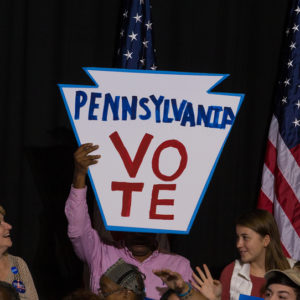If you’re planning to vote in Pennsylvania’s primary election in person on June 2, the slightly befuddled poll worker guiding you might be an out-of-uniform member of the Pennsylvania National Guard. That’s because the usual — often elderly — election workers might be too fearful of the coronavirus to man the polls.
Pennsylvania is preparing for what is being labeled an unprecedented “hybrid” primary election, where voting-by-mail is expected to represent a large proportion of ballots cast. Voting-by-mail is a controversial practice nationwide, with many claiming it is an invitation to increased voter fraud.
President Trump opposes the practice, while polls show most Democrats approve of voting-by-mail and Republicans are somewhat split.
Voters throughout the state will for the first time be able to vote by mail because of Act 77 of 2019, which Gov. Tom Wolf signed into law. The law created the option of mail-in ballots with no excuse needed, along with later deadlines for voter registration and for returning mail-in and absentee ballots.
In late March, Wolf signed a bill rescheduling Pennsylvania’s 2020 primary election from April 28 to June 2. The legislation also makes other changes, in consideration of the coronavirus crisis.
As of Wednesday, approximately 1 million of the 7.3 million voters eligible to participate in the primary have applied for mail-in ballots, according to numbers provided to Delaware Valley Journal by the Pennsylvania Secretary of State’s office.
“We are in an unprecedented time and are facing a major public health crisis in a presidential election year,” Wolf said at a news conference last week. “I want Pennsylvanians to know that they have options for how to cast their ballots, including both voting by mail and voting in person.”
In the Keystone State, there are two options for mail ballots: You may either choose a mail-in ballot — or request an absentee ballot to complete and return to your county election office.
In order to request either ballot type, you must be registered to vote. The last day to register to vote is May 18 and voters have until May 26 to apply for a mail-in ballot.
The bill Wolf signed in March will also allow counties to begin processing and tabulating mail ballots when the polls open at 7 a.m. on Election Day, rather than after the polls close at 8 p.m.
Using only mail-in ballots — which has been strongly promoted by Wolf — was not feasible for the June 2 primary, Pennsylvania Secretary of State Kathy Boockvar said at a recent news conference.
“There is not enough time to adequately ensure participation in our democracy with mail-in voting alone,” Boockvar said.
Because of the expected unprecedented number of Pennsylvanians who will vote by mail this year, it’s likely that there will be some delay in the counting of ballots, she added.
While several state delegates and county officials have voiced alarm about the security of mail-in voting, Boockvar insists it’s not a problem for Pennsylvania.
“So, first and foremost, I want every voter to know that ballots have specific correspondence ID and voter ID, that’s part of the absentee or mail-in ballots issued to a voter,” she said. “So only one ballot can be entered for a folder into the system — so it’s literally not possible for more than one ballot to be attributed to a voter in our system.”
Meanwhile, extensive preparations are being made to organize polling places.
Pennsylvania counties will get part of $13 million in federal funding to help handle the additional costs of the election, such as “special equipment that can help open the ballots, separate all the envelopes, and then of course high-speed, high-capacity scanners are critical in this,” Boockvar said. In addition, the state has procured masks, gloves, hand sanitizers, cleaners for the voting systems, and floor tape to enable social distancing at the polls.
Other changes may await in-person voters, depending on the location. During a news conference last week, for example, a Bucks County commissioner said they expected to ask every person who comes into a polling place to wear a mask.
Then there is the option of using the Pennsylvania National Guard as poll workers.
Boockvar noted that Guardsmen have been critical on the frontlines of the virus in many ways, but may not be as capable as seasoned poll workers. This could also mean lines at polling places could be longer.
Both Boockvar and Wolf urged both public and private facilities, who may be called on as polling places, to work with the counties in any way that they can.

